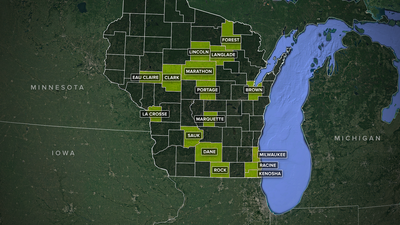MILWAUKEE -- Election Day is in two weeks but little talk has been had about a question on marijuana legalization on many ballots.
Milwaukee is one of 16 counties to have an advisory referendum on the legalization of Marijuana. Four counties, including Milwaukee, will have a question about legalizing marijuana in the same way as alcohol. Ten counties will have a question about legalizing marijuana for medicinal purposes. Eau Claire and Racine Counties will have questions on both.
But come November 6th, nothing will change legally on the green stuff.
"Nothing would change," George Christenson, Milwaukee County Clerk said. "It's purely advisory but it sends a message to elected officials as to what's important to the electorate."

The 16 counties with the advisory referendum are Milwaukee, Rock, Dane, Sauk, Brown, La Crosse, Marathon, Portage, Clark, Langdale, Marquette, Eau Claire, Forest, Kenosha, Lincoln and Racine. The cities of Racine and Waukesha will also have the question.
While the opinion on marijuana has relaxed over the years, in Franklin some people think it should remain illegal.
"I don't approve of people smoking marijuana," Beverly Scheunemann of Franklin said. "Anything that hurts your brain, makes you confused, it's a no-no. It will make no difference to me. I'm near the end of my life but I feel sorry for the people that are going to be so befuddled in the time to come that they can't use their common sense anymore."
In a recent Marquette Law School poll, 61 percent of Wisconsin residents were in favor of regulating recreational marijuana in the same was as alcohol.
"Oh yeah, definitely," Mary Trainer of Franklin said. "That would be a good regulation. I just don't like that there's such an imbalance that the average person can use it. We control where people can drink. I just don't think people should be walking and riding and driving and using it like it's a regular cigarette when it's not."
Identifying impaired drivers is a difficulty. Amy Miles, Director of Forensic Toxicology with the Wisconsin State Laboratory of Hygiene says they're working on an oral fluid test to help identify those under the influence.
"Marijuana, behind alcohol, is the number one drug we see in our impaired drivers in Wisconsin," Miles said. "[But], everyone is different. Everyone consumes differently, edibles versus smoking."
She says while they can test for the compound which can impair drivers, there is no ".08" equivalent like there is with alcohol.
"It's a big piece of contention amongst the scientific community in that, we recognize there really is no blood alcohol concentration for THC. So there is no BAC for THC. We already see marijuana as one of the most common drugs, behind alcohol, in impaired drivers and our crashes and it's not yet legal. We need to learn lessons from Colorado and Washington and those other states that have already legalized. What are the pitfalls and the benefits for legalizing marijuana and really go into it educated instead of kind of following suit. I'm hopeful, if Wisconsin ever comes to this point where marijuana is legalized, they do so in a smart and scientific way where they've weighed all the odds and not just followed what everyone has done."
The benefits are something the Southeast Wisconsin branch of National Organization for the Reform of Marijuana Laws (NORML) hopes legislators can see from voters.
"It's definitely more than just smoking pot," Eric Marsch, Executive Director of Southeast Wisconsin NORML said. "We get emails all the time from people. Their kids have seizures or it's the only thing that helps reduce the amount of opiates they're using. There's all kinds of people who desperately need this. It makes their life so much better medicinally."
Marsch says even the non-pot smokers can benefit from weed going legal in the state.
"It can create tens of thousands of jobs and $130 million in revenue," Marsch said. "It's more jobs than Foxconn and with revenue generation rather than spending money."
With the advisory referendum in 16 counties, Marsch says 52 percent of Wisconsin's population will have the question on their ballot. So if the November 6th poll is reflective of the Marquette Law School poll, it could put Wisconsin on pace to be the next state to go legal.
"It would mean it's a lot easier to pressure legislators to legalize cannabis here," Marsch said. "It's going to help move the ball forward."
Click here to see what the marijuana referendum question looks like in your county.



